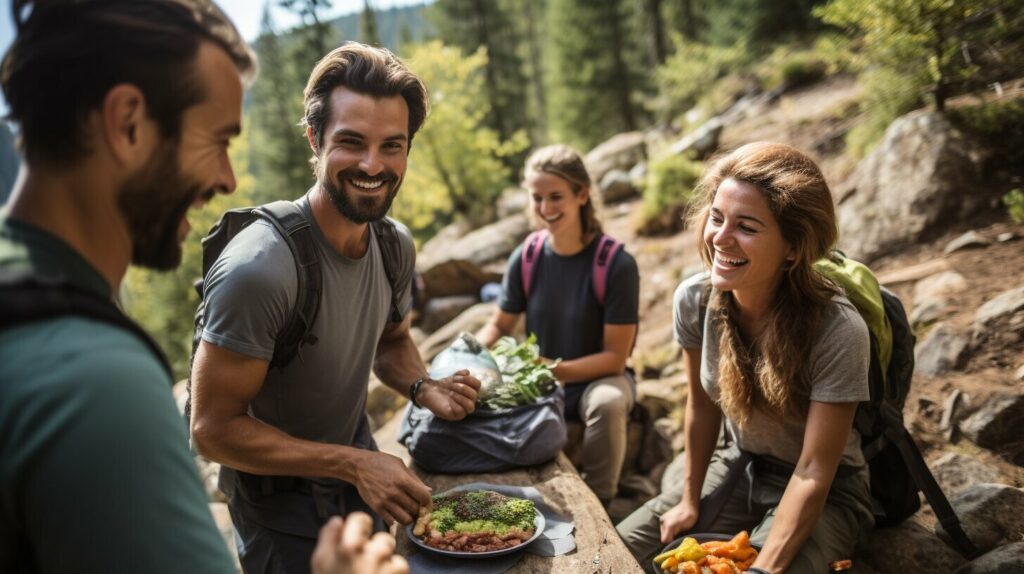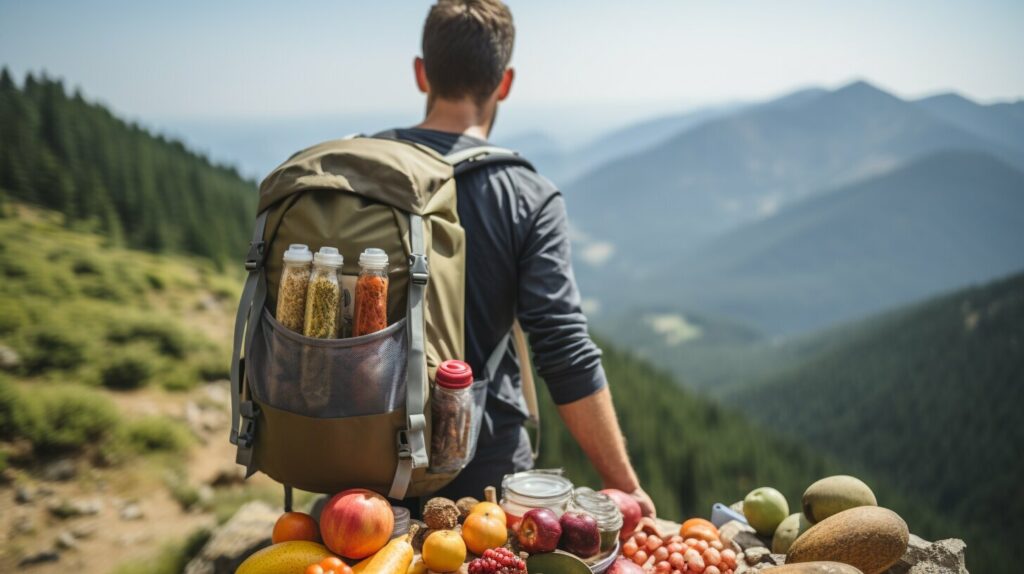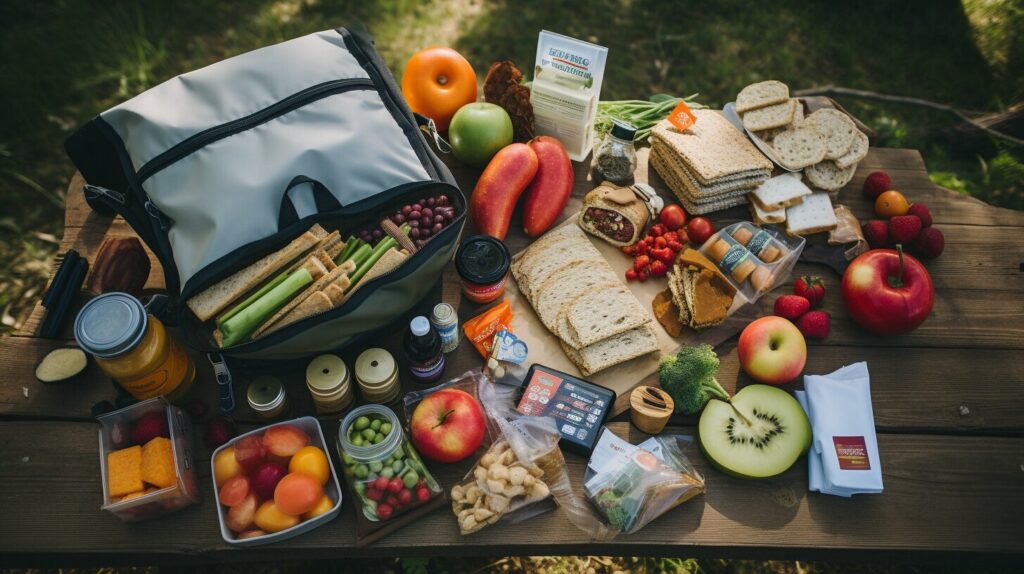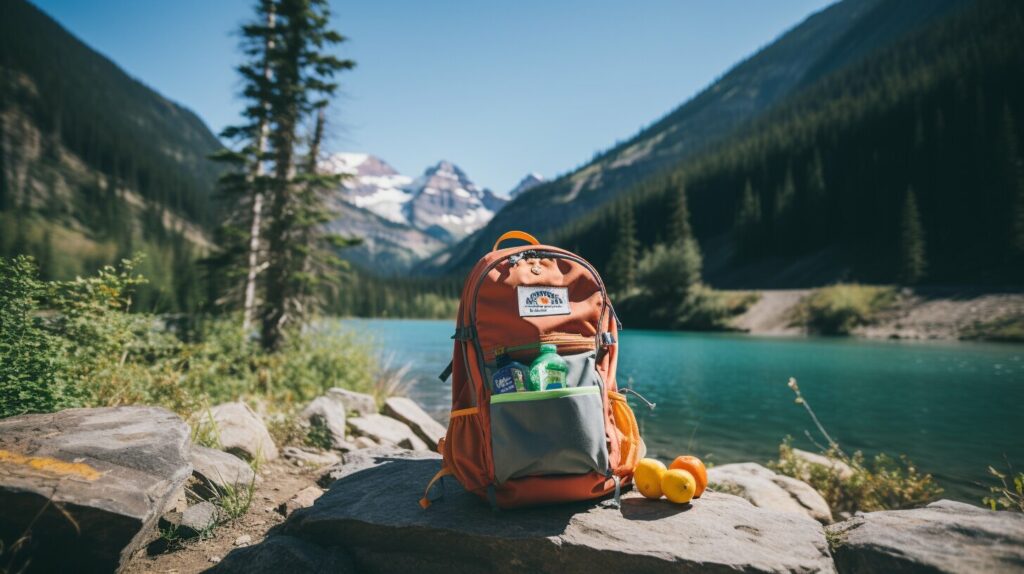Are you an outdoor enthusiast looking to fuel your body with healthy meals while exploring the wilderness? Backcountry nutrition might just be the solution you need. Proper nutrition can help you optimize your physical performance, boost your energy levels, and support your overall wellbeing.
But when it comes to planning and packing meals for outdoor activities, convenience and portability are key. That’s why there are now so many portable food options specifically designed for adventurers who are always on the go.
In this section, we will explore the concept of backcountry nutrition and highlight the benefits of fueling your body with nutritious meals in the wilderness. We will also discuss the importance of portable food options and provide insights into how to plan your meals for extended wilderness explorations.
Key Takeaways
- Backcountry nutrition can optimize your physical performance and support your overall wellbeing during outdoor activities
- Proper nutrition requires planning and preparation, especially when you are in remote locations
- Portable food options are a convenient way to fuel your body in the wilderness
- Essential nutrients are necessary to sustain energy levels and promote muscle repair and growth
- Backcountry nutrition can enhance cognitive function and contribute to a sense of overall wellbeing for outdoor enthusiasts
Nutrition Tips for Outdoor Adventures
When it comes to outdoor adventures, proper nutrition can make all the difference in optimizing performance and enhancing your overall experience. Here are some nutrition tips to keep in mind for your next backcountry excursion:
- Plan ahead: Before embarking on your trip, take the time to plan out your meals and snacks to ensure you have a balanced and nutritious food supply. Consider the duration of your trip, the amount of physical activity you will be engaging in, and the availability of resources for cooking and storing food.
- Choose nutrient-dense foods: Opt for foods that are packed with essential nutrients, such as complex carbohydrates, lean proteins, healthy fats, and vitamins and minerals. Examples include whole grains, nuts, seeds, fruits and vegetables, lean meats, and low-fat dairy products.
- Stay hydrated: Adequate hydration is crucial for optimal physical performance in the backcountry. Pack a sufficient supply of water or a water filtration system to ensure you stay hydrated throughout your trip.
- Snack smart: When taking breaks or engaging in low-intensity activities, aim for high-energy and nutrient-dense snacks to maintain energy levels. Examples include trail mix, energy bars, and jerky.
- Replenish your electrolytes: During extended outdoor activities, electrolytes such as sodium, potassium, and magnesium can become depleted through sweat. Consider packing electrolyte replenishing drinks or tablets to maintain proper levels.
Essential Nutrients for Outdoor Enthusiasts
To optimize your performance and ensure proper health and nutrition during outdoor adventures, it’s important to consume a balanced supply of essential nutrients. Here are some key nutrients to focus on:
Disclosure: When you buy through links on our site, we may earn an affiliate commission.
| Nutrient | Importance | Food Sources |
|---|---|---|
| Carbohydrates | Provide energy for physical activity | Whole grains, fruits, vegetables, legumes |
| Protein | Essential for muscle repair and growth | Lean meats, poultry, fish, beans, nuts, seeds |
| Healthy Fats | Provide sustained energy and support brain function | Nuts, seeds, fatty fish, avocado, olive oil |
| Vitamins and Minerals | Essential for overall health and wellbeing | Dark leafy greens, citrus fruits, dairy products, lean meats, beans |
By focusing on these essential nutrients and incorporating nutritious meals and snacks into your backcountry nutrition plan, you can fuel your body for optimal performance and a successful outdoor adventure.

Designing a Meal Plan for Your Outdoor Journey
Meal planning is crucial for backcountry trips to ensure that you have enough energy to sustain yourself while on the go. This involves preparing and packing your meals ahead of time and choosing the right food items that are lightweight, nutritious, and easy to carry. The best meal planning for backcountry trips involves following these tips:
- Think ahead and plan your meals for the entire trip. Consider the duration, intensity, and distance of your activities to determine the appropriate number of calories you need to consume.
- Choose foods that are high in carbohydrates, protein, and healthy fats to provide you with the energy you need to perform at your best. Examples include whole grains, nuts, seeds, and lean meats.
- Opt for dehydrated or freeze-dried meals, which are compact, lightweight, and easy to prepare. They’re also a great option for longer trips where resupplying may be difficult.
- Utilize high-calorie snacks, such as energy bars, trail mix, and jerky, to keep your energy levels up throughout the day. These snacks provide a quick source of fuel and can easily be consumed on the go.
- Invest in a quality backpacking stove and cooking utensils to make preparing meals in the backcountry easier and more efficient.
By following these tips, you can ensure that you have a well-balanced and nutritious meal plan for your backcountry trip. Remember to pack enough food to provide you with the energy you need to fuel your adventures and always pack out your trash to keep the wilderness clean.

Fueling Your Outdoor Adventures
When engaging in outdoor activities, it’s essential to maintain energy levels to sustain performance throughout the day. Energy-packed snacks are an easy and convenient way to fuel up while on the go. Here are some portable and nutritious snack options to consider for your next wilderness trip:
- Trail mix: Combine your favorite nuts, seeds, and dried fruits for a tasty and energizing snack. It’s high in healthy fats, protein, and fiber, which make it a great choice for maintaining sustained energy levels.
- Jerky: A savory and protein-rich snack that’s easy to pack and carry. Choose from a variety of meats, such as beef, turkey, or even salmon, for a quick and satisfying snack.
- Energy bars: With a wide range of options available, energy bars offer a combination of carbohydrates, protein, and other essential nutrients for sustained energy. Look for bars that are high in fiber and low in added sugars for optimal nutrition.
- Hummus and vegetables: For a more substantial snack, pack some pre-cut veggies and a small container of hummus. This protein-rich snack provides essential nutrients and is perfect for a mid-day refuel.
- Dried fruit: An easy and portable snack that’s rich in fiber, vitamins, and minerals. Choose from a variety of options, such as apricots, figs, or dates, for a tasty and healthy snack that will keep you going all day.
Remember to pack your snacks in airtight bags or containers and label them with the contents and date. This will help you stay organized, prevent food waste, and ensure that you’re consuming fresh and safe food.

Optimizing Nutrition in Remote Locations
When it comes to outdoor adventures, choosing and preparing healthy meals can be a challenge, especially in remote locations. However, with careful planning and consideration, you can optimize your nutrition and fuel your body for optimal performance and overall wellbeing.
As fresh food options may be limited, it’s essential to focus on nutrient-dense food options that will provide your body with the necessary vitamins and minerals. Additionally, proper hydration is crucial to maintaining optimal physical function and mental clarity.
Supplementation can also be helpful in optimizing nutrition in remote locations. For example, if you’re unable to obtain enough Omega-3 fatty acids through your food choices, consider taking a supplement to support brain and heart health.
When selecting food options, it’s important to make mindful choices and opt for meals and snacks that are easy to pack and carry. Avoid heavy, sugary, and fatty foods that may slow you down and cause digestive distress. Instead, choose carbohydrates, protein, healthy fats, and micronutrient-rich foods that will sustain your energy levels throughout your outdoor activities.

“The key to optimizing nutrition in remote locations is planning and consideration. Focus on nutrient-dense food options, hydration, and supplementation, and make mindful food choices.”
The Role of Balanced Diet in Wilderness Exploration
A balanced diet is essential for your health and wellbeing, especially when exploring the wilderness. In the backcountry, it’s important to prioritize nutrient-dense meals that fuel your body and promote optimal performance. A balanced diet should include the optimal ratio of macronutrients, protein, carbohydrates, healthy fats, and essential vitamins and minerals.
When planning your meals for your outdoor adventures, aim to include a variety of natural and whole foods to meet your nutritional needs. Fresh fruits and vegetables may be challenging to carry, but you can opt for dehydrated or freeze-dried options that will not only lighten your load but also provide you with the necessary nutrients.
If your adventure will take longer than a few days, you might want to consider packing multivitamin supplements to ensure that your body gets all the nutrients it needs. Additionally, incorporating healthy fats like nuts, seeds, and avocados can help to meet your calorie requirements while also supporting cognitive function and ensuring nutrient absorption.
Ultimately, maintaining a balanced diet in the wilderness is key to sustaining energy levels, enhancing cognitive function, and supporting overall health and wellbeing during outdoor activities. By prioritizing your nutrition, you will enjoy your backcountry adventures to the fullest while keeping your body nourished.

Incorporating a balanced diet will help fuel your body in the backcountry, allowing you to enjoy your adventure while keeping your body nourished.
Benefits of Backcountry Nutrition for Overall Wellbeing
Proper nutrition in the backcountry can have a significant impact on your overall wellbeing as an outdoor enthusiast. Beyond physical performance, backcountry nutrition can enhance cognitive function, boost mood, and contribute to a sense of overall balance and wellbeing.
Eating a balanced and nutritious diet while adventuring in the wilderness can help to regulate your mood and energy levels, reducing the risk of mood swings and fatigue. A diet rich in essential nutrients such as protein, carbohydrates, and healthy fats can help to stabilize blood sugar levels and keep energy levels consistent throughout the day.
Additionally, a focus on backcountry nutrition can have mental health benefits. The sense of accomplishment and wellbeing that comes from fueling your body properly on a challenging wilderness adventure can have a positive impact on mood and self-esteem.
“Eating a balanced and nutritious diet while adventuring in the wilderness can help to regulate your mood and energy levels, reducing the risk of mood swings and fatigue.”
Moreover, prioritizing your nutrition in the backcountry can improve your ability to cope with stress and anxiety that may arise from challenging wilderness situations. Eating a healthy and balanced diet can support the body’s natural stress response, reducing the physical toll of stress on the body.
Ultimately, prioritizing backcountry nutrition can help you feel more connected to nature and your own body, contributing to a sense of overall wellbeing and balance.

Incorporating proper nutrition into your wilderness adventures is essential for promoting optimal performance and overall wellbeing. By making informed food choices and prioritizing your nutrition needs, you can fuel your body for the rigors of outdoor activities and experience the benefits of a healthy and balanced diet in the remote wilderness.
Portable Food Options for Outdoor Activities
When planning your outdoor adventures, it’s essential to consider the type of food you’ll need to fuel your body throughout the trip. Portable food options are ideal for outdoor enthusiasts who want to keep their backpacks light while still enjoying healthy and nutritious meals. Here are some popular portable food options for outdoor activities:
- Energy bars: These compact bars are a great source of carbohydrates and protein. They’re easy to pack and come in various flavors and sizes. Some popular brands include Clif Bars, Kind Bars, and RX Bars.
- Trail mix: Trail mix is a convenient snack that provides a mix of carbohydrates, healthy fats, and protein. You can buy pre-made trail mix or make your own by combining nuts, dried fruits, seeds, and chocolate chips.
- Canned foods: Canned foods are a good source of protein and can be easily heated up over a portable stove. Some popular canned foods for outdoor adventures include tuna, chicken, and beans.
- Dehydrated meals: Dehydrated meals are lightweight and easy to pack, making them a popular choice for backpackers and hikers. These meals come in various flavors and are available from brands like Mountain House and Backpacker’s Pantry.
- Fruit: Fresh fruit is an excellent source of carbohydrates, fiber, and vitamins. Some fruits that are easy to pack and carry include apples, bananas, and oranges.
- Peanut butter: Peanut butter is a high-calorie food that provides a good source of protein and healthy fats. You can spread it on crackers or bread for a quick and satisfying snack.
Remember to consider your nutritional needs when selecting portable food options for your outdoor activities. Look for foods that provide a good source of carbohydrates, protein, and healthy fats to keep your energy levels up and your body functioning at its best.

Fueling Your Outdoor Adventures
When it comes to fueling your body in the backcountry, it’s important to focus on essential nutrients that support physical performance and overall health. These nutrients include:
- Carbohydrates: These are the primary source of energy during outdoor activities. Foods such as whole grains, fruits, and vegetables provide a steady supply of carbs.
- Protein: Protein is essential for repairing and building muscle. Good sources of protein for backcountry trips include nuts, seeds, and lean meats such as chicken or fish.
- Healthy Fats: Fats are necessary for energy production and maintaining proper bodily function. Nuts, seeds, and avocados are great sources of healthy fats.
- Micronutrients: These include essential vitamins and minerals that support overall health. Foods such as leafy greens, citrus fruits, and nuts provide important micronutrients that are crucial for backcountry nutrition.
By incorporating these essential nutrients into your backcountry meals, you can ensure that you’re properly fueling your body for optimal performance. Remember to pack a variety of nutrient-dense foods and prioritize hydration to support your body during outdoor adventures.

Enhancing Performance in the Great Outdoors
Proper nutrition plays a critical role in enhancing your performance during outdoor activities. By fueling your body with the right nutrients, you can improve your endurance, speed up recovery, and push your physical capabilities to new heights.
Carbohydrates are essential for sustained energy and should make up a significant portion of your backcountry meals. Protein is crucial for repairing and building muscle, which is especially important when engaging in activities that put a strain on your muscles.
Healthy fats, such as those found in nuts and seeds, provide long-lasting energy and are essential for maintaining proper bodily functions. Additionally, micronutrients like vitamins and minerals are necessary for overall health and wellbeing, with vitamin C being particularly important for boosting immune function.
By optimizing your nutrition in the backcountry, you can achieve your outdoor goals with greater ease and efficiency. With proper fueling of your body, you’ll be able to climb that mountain, complete that multi-day hike, or conquer that challenging trail with greater confidence and success.

Conclusion
By prioritizing your nutrition in the backcountry, you can unlock healthy living and enhance your performance during outdoor activities. From efficient meal planning to portable food options, there are several ways to ensure you’re fueling your body with the essential nutrients it needs to thrive in remote locations.
Remember to maintain a balanced diet, optimize your nutrition in areas with limited food options, and stay hydrated. By doing so, you’ll not only improve physical performance but also enhance cognitive function and boost your overall sense of wellbeing.
So, whether you’re planning a day hike or a multi-day backpacking trip, take control of your health in the backcountry and fuel your adventures with backcountry nutrition.
FAQ
What is backcountry nutrition?
Backcountry nutrition refers to the practice of fueling your body with nutritious meals while engaging in outdoor activities in remote locations. It involves consuming food that provides essential nutrients and sustains energy levels for optimal physical performance in the wilderness.
Why is backcountry nutrition important?
Backcountry nutrition is important because it plays a significant role in promoting healthy living for outdoor enthusiasts. It ensures that your body receives the necessary nutrients to support physical activity, enhances performance, speeds up recovery, and contributes to overall wellbeing in challenging outdoor environments.
How can I plan meals for backcountry trips?
Efficient meal planning is crucial for backcountry trips. You can plan your meals by considering lightweight and nutrient-dense options that are easy to carry. It is essential to pack meals that provide a balance of carbohydrates, protein, healthy fats, and essential vitamins and minerals for sustained energy and overall health during extended wilderness explorations.
What are some energy-packed snacks for wilderness trips?
Energy-packed snacks are crucial for sustaining energy levels during wilderness trips. Some nutritious options include trail mix, energy bars, jerky, dried fruits, nuts, and nut butter packets. These snacks are easily accessible and provide a good source of protein, healthy fats, and carbohydrates to fuel your outdoor activities.
How can I optimize nutrition in remote locations with limited food options?
To optimize nutrition in remote locations with limited food options, it is important to focus on proper hydration, consider supplementation when necessary, and make mindful food choices. Prioritize foods that are nutrient-dense, such as dried fruits, canned fish, and dehydrated meals, and ensure you are meeting your body’s nutritional needs despite the challenges of resupplying in the backcountry.
What is the role of a balanced diet in wilderness exploration?
Maintaining a balanced diet is crucial for wilderness exploration. A balanced diet provides the optimal ratio of macronutrients (carbohydrates, protein, and fats) and includes essential vitamins and minerals. This helps support overall health, sustain energy levels, repair and build muscle, and ensure proper bodily functions while enduring the physical demands of outdoor activities.
What are the benefits of backcountry nutrition beyond physical performance?
Backcountry nutrition offers benefits beyond physical performance. Proper nutrition in the backcountry can enhance cognitive function, boost mood, and contribute to a sense of overall wellbeing. By fueling your body with nutritious meals, you support both your physical and mental health, allowing you to enjoy your outdoor adventures to the fullest.
What are some portable food options for outdoor activities?
There are various portable food options available for outdoor activities. Some recommendations include dehydrated meals, energy bars, freeze-dried fruits, nut butter packets, and individual servings of trail mix. These items are lightweight, compact, and provide the necessary nutrients to fuel your outdoor adventures conveniently.
What are the essential nutrients for backcountry nutrition?
The essential nutrients for backcountry nutrition include carbohydrates, protein, healthy fats, and micronutrients. Carbohydrates provide energy, protein helps in muscle repair and recovery, healthy fats provide sustained energy, and micronutrients (vitamins and minerals) support overall health and wellbeing during outdoor activities in challenging environments.
How does backcountry nutrition impact performance?
Backcountry nutrition directly impacts performance during outdoor activities. By fueling your body with proper nutrition, you enhance endurance, speed up recovery, and improve overall physical capabilities in the backcountry. Optimal nutrition supports sustained energy levels, muscle repair, and overall physical health, leading to improved performance and enjoyment of your outdoor adventures.




